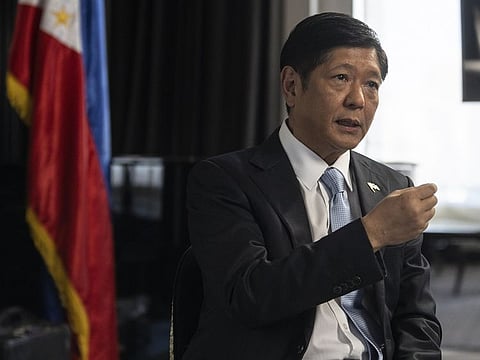Philippines seeks Russian fuel as inflation bites, Marcos says
“Philippines is ‘close’ to striking agreements with Russia and others,” said Marcos

Manila: The Philippines is talking to Russia about buying fuel and other key commodities because the country’s national interest overrides potential concerns over the war in Ukraine, President Ferdinand Marcos Jr. said in an interview with Bloomberg TV.
Noting that the Philippines can’t be complacent in relying on traditional suppliers, Marcos said the Southeast Asian nation was having conversations with Russia and other countries to diversify its supply chain for food stuffs and agricultural necessities like fertilizer to keep prices down.
“Now maybe we need to approach Russia, say that maybe they can loosen up and provide us with fuel,” Marcos said on Friday afternoon from New York, where he is attending the United Nations General Assembly. He added that they were “close” to striking agreements with Russia and others.
“The political side of it has been a little tricky, but nonetheless, the national interest comes first,” he said, when asked about US-led sanctions against Russia over its attacl on Ukraine. “We need to find those new sources of fuel. But that applies not only to fuel, it applies to things like feed, fertilizer, other inputs that are just critical for us.”
The comments come after a hectic week of global diplomacy in New York where US President Joe Biden and other G-7 leaders tried to gain more international momentum for a campaign to sanction and isolate Russia over its war in Ukraine. The comments from Marcos, who met with Biden this week, reflect the difficult choices facing leaders in many developing nations that are facing potential political fallout as rising prices drive people into poverty.
Taming inflation in Philippines
Marcos’s economic team is aiming for growth of at least 6.5 per cent annually through 2028, bringing the country back to its pre-pandemic expansion levels. A broad reopening from what was among the world’s strictest pandemic lockdowns has supported economic recovery.
Still, the new government is facing economic challenges, with the surge in global commodity prices pushing inflation above target in a nation that imports goods from oil to wheat. That’s further aggravated by the peso’s slump to a record low. The central bank has raised interest rates by 225 basis points so far this year to tame inflation.
The Southeast Asian nation has also experienced shortages in food items including sugar and onions. Marcos has made the rare move of helming the agriculture department, as he seeks to deliver on his campaign pledge of food sufficiency.
Marcos said inflation was a reflection of the strength of the US dollar, and that the Federal Reserve had been “very, very aggressive,” forcing the Philippine central bank to also raise rates steeply. He said his government was closely following prices to ensure they don’t get out of control for ordinary Filipinos.
“We cannot allow it to reach to an extent that people simply cannot buy their food, simply cannot pay their electricity or water, all these basic things,” Marcos said. “We’re watching very closely to make sure it never gets to that point.”
Sign up for the Daily Briefing
Get the latest news and updates straight to your inbox


